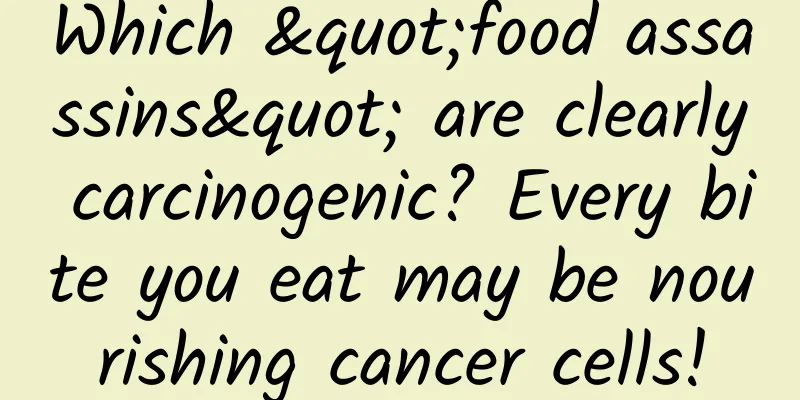Which "food assassins" are clearly carcinogenic? Every bite you eat may be nourishing cancer cells!

|
Which “food assassins” are clearly carcinogenic? The International Agency for Research on Cancer under the World Health Organization classifies carcinogens into five categories according to their carcinogenic risk to humans: Class 1, Class 2A, Class 2B, Class 3 and Class 4, of which Class 1 substances have clear carcinogenicity. 1. Moldy food → liver cancer Moldy food is scary because it contains a type of carcinogen: aflatoxin. Aflatoxin is mainly a secondary metabolite produced by Aspergillus flavus and Aspergillus parasiticus. The probability of aflatoxin appearing in food and feed in hot and humid areas is highest. They exist in soil, animals, plants, and various nuts, and are especially easy to contaminate peanuts, corn, rice, soybeans, wheat and other grain and oil products. They are the most toxic mycotoxins and are extremely harmful to human health. Aflatoxin mainly damages liver function and has strong carcinogenic, teratogenic and mutagenic effects. It can not only cause liver cancer, but also induce bone cancer, kidney cancer, colorectal cancer, breast cancer, ovarian cancer, etc. Many friends in the circle know that arsenic is very toxic. About 1/5 gram (60 mg to 200 mg) can cause death, and the toxicity of aflatoxin is 68 times that of arsenic! 2. Chinese salted fish → nasopharyngeal cancer Because of the high salt content of salting and exposure to the sun, fish will produce a large amount of nitrite during the salty and dehydrated process. Nitrite goes to the stomach and after some chemical reactions, it is easy to produce nitrosamines, which are highly carcinogenic. 3. Betel nut → oral cancer Betel nut was identified as a Class 1 carcinogen by the World Health Organization as early as 2003. In addition to blackening, wearing, and loosening teeth, causing gum atrophy, and causing periodontal disease, oral submucous fibrosis, and oral leukoplakia, chewing betel nut can also lead to oral cancer. 4. Alcohol → Liver Cancer The harm of alcohol to the liver is cumulative. As the amount of alcohol increases and the drinking time prolongs, it progresses from alcoholic fatty liver to alcoholic hepatitis to alcoholic cirrhosis, and finally leads to liver cancer. Studies have shown that compared with non-drinkers, people who drink a lot are more likely to get digestive tract cancer, lung cancer, breast cancer, bladder cancer, prostate cancer, pancreatic cancer, etc. Therefore, it is recommended not to drink and not to persuade others to drink! Which “food assassins” are more carcinogenic? In addition to the Class 1 substances mentioned above which have clear carcinogenicity, the following Class 2A substances are also highly carcinogenic! 1. Overcooked food → esophageal cancer A report published by the International Agency for Research on Cancer in the journal The Lancet Oncology pointed out that drinking very hot food is likely to cause esophageal cancer. "Very hot" here refers to any food over 65 degrees Celsius. Frequent consumption of food over 65 degrees Celsius will repeatedly damage the esophageal mucosa under high temperatures, and long-term repeated stimulation can easily cause esophageal mucosal cancer. 2. Grilled and fried food → colon cancer The reason why grilled food, especially meat grilled food, is worrying is closely related to two known carcinogens, heterocyclic amines and polycyclic aromatic hydrocarbons. Protein-rich foods produce heterocyclic amines when cooked at high temperatures, while the smoke produced by burning fat on the grill contains polycyclic aromatic hydrocarbons. Vegetable oils used for multiple frying and high oil temperatures used for frying produce more benzopyrene. When cooking oil is heated to 270°C, the smoke produced contains compounds such as benzopyrene. 3. Red meat → pancreatic cancer In nutrition, meat is divided into red meat and white meat. Red meat refers to meat that is red in texture when not cooked. From this definition, most mammal meat is red meat. Common red meat in life includes: pork, beef, lamb, etc. Studies have confirmed that excessive intake of red meat increases the risk of pancreatic cancer, colorectal cancer, lung cancer, etc. Although red meat is classified as a Class 2A carcinogen, it does not mean that it is "not edible". The World Cancer Research Fund recommends that the weekly intake of red meat should not exceed 500 grams. How to reduce the risk of cancer? 1. Minimize exposure to carcinogens The carcinogenicity of carcinogens is closely related to the dose. Even Chinese salted fish containing Class 1 carcinogens will not cause cancer after eating it once, but if you eat a lot of it every day for a long time, the risk of nasopharyngeal cancer will increase. Faced with many reports and rumors about "carcinogens", friends do not need to be too nervous, but should be treated rationally. Changing eating habits is the most important thing. 2. Use steaming, boiling and stewing more instead of frying, deep-frying and roasting Cooking methods play a vital role in the safety and nutrition of food. If you want to stay away from carcinogens in food, avoid stir-frying, frying, grilling, etc., use more cooking methods such as steaming, boiling, and stewing, eat more fresh ingredients, and eat less processed foods. 3. Maintain a normal weight and avoid being overweight or obese The body mass index (BMI) is calculated by dividing the weight in kilograms by the square of the height in meters, that is, body mass index (BMI) = weight (kg) ÷ height (m2). A BMI between 18.5 and 24.9 is normal and healthy. 4. Keep exercising and avoid sitting for long periods of time Sitting for long periods of time and lack of exercise can easily lead to problems such as being overweight and obesity, and can increase the risk of various cancers including colorectal cancer. It is recommended to get up and move around for 15 minutes every 1 to 2 hours of work, exercise for at least 30 minutes a day, and at least 150 minutes a week. 5. Get the necessary sleep time Keep a regular schedule and avoid staying up late. It is recommended that adults get 6 to 8 hours of sleep a day. The key is not to stay up late and remember not to turn on the lights when sleeping. 6. Maintain a regular and balanced diet and avoid picky eating You should eat whole grains, meat, vegetables, and fruits, and avoid and reduce the intake of "junk food". If you do not take in enough dietary fiber, it is easy to increase the risk of colorectal cancer. Avoid skipping breakfast, overeating, and do not eat too much or too full. 7. Vaccination and regular physical examinations Prevent and control hepatitis B and hepatitis C infections by getting vaccinated against hepatitis B; prevent and control human papillomavirus (HPV) infections by getting HPV vaccines for people of appropriate age; timely and standardized treatment of precancerous conditions (precancerous diseases, precancerous lesions), etc. Have regular physical examinations to prevent diseases before they occur and to prevent changes after they have already occurred. |
Recommend
Online fission practice: How to attract tens of thousands of traffic in one hour?
Local traffic online fission, how do I make the f...
Debug your code like a doctor
Designing and maintaining good software is a neve...
Digital marketing and private domain traffic operation, refined customer operation reconstructs the marketing closed loop
In the current era of the new mobile commerce mar...
Full of useful tips on home fire prevention: This is what a fire extinguisher looks like!
Your browser does not support the video tag What ...
How many years can Apple's iPhone last? A detailed analysis from three dimensions
Generally speaking, how long is the usage cycle f...
Advertising and Marketing: A Century of Change
The COVID-19 pandemic that is raging around the w...
Six pictures! Help you understand the "high-frequency synonyms" in this round of epidemic prevention and control
Venue code and health code, antigen test and nucl...
Ma Da Ge amateur internet celebrity incubation course
Introduction to the resources of Ma Da Ge amateur...
Dragon Ball Collection Collector's Edition
For the die-hard fans of Dragon Ball, it is not e...
Hupu APP Product Analysis Report
This article conducts product experience and anal...
How to tap into iOS channels for app promotion
Question 1: I don’t know where to tap into the iO...
There is a Shenzhen speed called Longgang
Shenzhen speed is the most brilliant legend since...
100,000 yuan entry-level compact domestic SUV, which one do you choose, Tiggo 8 Pro or Changan CS75 Plus?
The 2025 Chery Tiggo 8 PRO has five models, with ...









